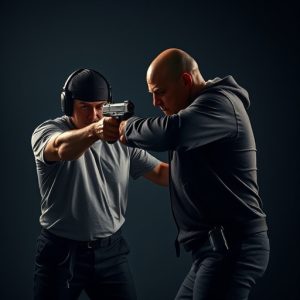Mastering Self-Defense Stun Guns: Certification for College Students’ Safety
For college students, understanding non-lethal weapon training, particularly self-defense stun guns,…….
For college students, understanding non-lethal weapon training, particularly self-defense stun guns, is vital due to rising safety concerns on campuses. These devices provide a practical solution for personal security while navigating campus life. Training programs equip students with risk assessment, de-escalation techniques, and legal knowledge related to their use, empowering them with life-saving tools and fostering a sense of empowerment. Obtaining a certification in self-defense stun guns is beneficial, as these devices are legally permitted in many areas and enhance safety, especially in potential threat zones. The process involves completing a comprehensive program covering usage, maintenance, and legal implications, promoting personal responsibility among peers. Mastering self-defense stun guns requires both physical proficiency and a deep understanding of legal and ethical considerations, including justifying force use and recognizing carrying requirements.
In today’s diverse campus environments, equipping students with non-lethal self-defense options like stun guns is becoming increasingly vital. This article explores the growing importance of Non-Lethal Weapon Training Certification for college students, focusing on the benefits and requirements involved in acquiring this skill. We’ll delve into the essential knowledge and skills needed to master self-defense stun guns, empowering students with tools to enhance their personal safety.
- Understanding Non-Lethal Weapon Training for College Students
- Benefits and Requirements of Obtaining a Certification
- Essential Skills and Knowledge to Master Self-Defense Stun Guns
Understanding Non-Lethal Weapon Training for College Students
For college students, understanding non-lethal weapon training is crucial, especially in light of growing safety concerns on campuses nationwide. Self-defense stun guns are among the most popular tools being discussed and offered as part of this training. These devices provide a means for individuals to protect themselves without resorting to lethal force. The training typically covers not just how to use the weapons but also risk assessment, de-escalation techniques, and legal implications related to their use.
By participating in non-lethal weapon training programs, college students gain valuable skills that could prove life-saving in dangerous situations. The focus on self-defense stun guns offers a practical solution for personal safety while navigating the hustle and bustle of campus life. This proactive approach equips students with tools to protect themselves, fostering a sense of empowerment and security as they navigate their academic journey.
Benefits and Requirements of Obtaining a Certification
Obtaining a non-lethal weapon training certification offers numerous advantages, especially for college students considering self-defense options. In many jurisdictions, carrying self-defense stun guns is legal and provides individuals with an additional layer of personal safety, particularly in areas where potential threats may be prevalent. With a certification, students can gain confidence in their ability to protect themselves while also learning responsible use and handling techniques.
The process typically involves completing a comprehensive training program that educates participants on the legal aspects, proper usage, and maintenance of non-lethal weapons. This includes practical demonstrations and hands-on practice with stun guns, ensuring students understand the device’s range, activation mechanisms, and safety precautions. Meeting these certification requirements equips individuals to make informed decisions regarding self-defense and promotes a culture of personal responsibility and awareness among college students.
Essential Skills and Knowledge to Master Self-Defense Stun Guns
Mastering self-defense stun guns requires a deep understanding of essential skills and knowledge. College students interested in non-lethal weapon training should focus on developing proficiency in hand-to-hand combat techniques, such as strikes, blocks, and escapes. Understanding the principles of distance control and target identification is crucial for effective use of a stun gun, ensuring users can accurately deploy the device from safe distances while disarming or incapacitating an attacker.
Additionally, students must acquire detailed knowledge about the legal implications and ethical considerations surrounding self-defense stun guns in their jurisdiction. Understanding when and how to legally justify the use of force is as vital as mastering the physical application of the weapon. This includes recognizing the specific requirements for carrying and using a stun gun, as well as the potential consequences of misuse.
For college students seeking enhanced personal safety, self-defense stun guns offer a viable non-lethal option. Understanding the benefits and essential skills involved in mastering these devices through proper training is crucial. Obtaining a certification not only equips individuals with valuable self-defense tools but also instills confidence. By diving into this realm, students can navigate potential threats effectively while adhering to legal requirements.


